
The UK enjoyed the fastest economic growth in the developed world in 2014 at 3%. There are signs that lower levels of business investment is beginning to recover and the forecasts are for economic growth of around 2.5% this year and next. But this will be fuelled mainly by higher household spending. High employment levels, a combination of near-zero inflation and accelerating wage growth will help consumer confidence and the willingness to reduce savings and increase borrowings.
At the same time the prospects for any significant expansion in affordable housing have been thrown into doubt by the announcement of the extension of the right to buy to housing association tenants. Since the decline of local authority housebuilding in the 1980s, the UK hasn’t seen building enough houses to keep pace with population growth.
Instead of easing the pressure, we still seem to be in a world of rising house prices – except at the prime end of the market which is being hit by reduced foreign demand and stamp duty changes. Average house prices are being driven up by both a lack of new housebuilding and the fact that few homes are going up for sale.
Government data also shows rents are increasing and so the cost of housing is rising. At the same time with welfare cuts kicking in, the inability to access the private housing market (either through renting or owning) will become a growing issue.
In relation to government finances and that which may be available to local authorities, much will hinge on the likely growth of the economy from here on. On the positive side, the recent fall in oil and other commodity prices should help the recovery.
Inflation is also likely to stay low as recent improvements in real disposable incomes and near record employment levels are not yet leading to any increased inflationary pressures. Interest rates are therefore unlikely to be raised before 2016. On current trends, even if they start rising next year, the new normal could be just 2.5% – half of what it used to be. That is good news for households and businesses but also for mortgage holders as the burden of mortgage repayments, though likely to rise, will be contained.
But the international environment remains uncertain. Not only are emerging markets such as China slowing down and international trade is still hampered by lack of finance, but the Eurozone remains in crisis and is recovering too slowly for comfort. What is also particularly hard to calculate is the impact on businesses of the UK voting no to staying in the EU in the forthcoming referendum. As a result, most independent commentators expect UK growth to average just 2.3-2.4% a year after 2015 but with sizeable downward risks. With slower growth the UK government is likely to be still needing to borrow in 2019-2020 – the year in which George Osborne and the independent Office for Budget Responsibility expect to be running a fiscal surplus.
Ultimately, this means that deficit reduction will be a three parliament problem as opposed to a two parliament one. And without active and positive government intervention the problem of unaffordable housing will only get worse.
Vicky Pryce is chief economic adviser at consulting firm CEBR and will be speaking at the National Housing Federation annual conference on Friday 25 September

